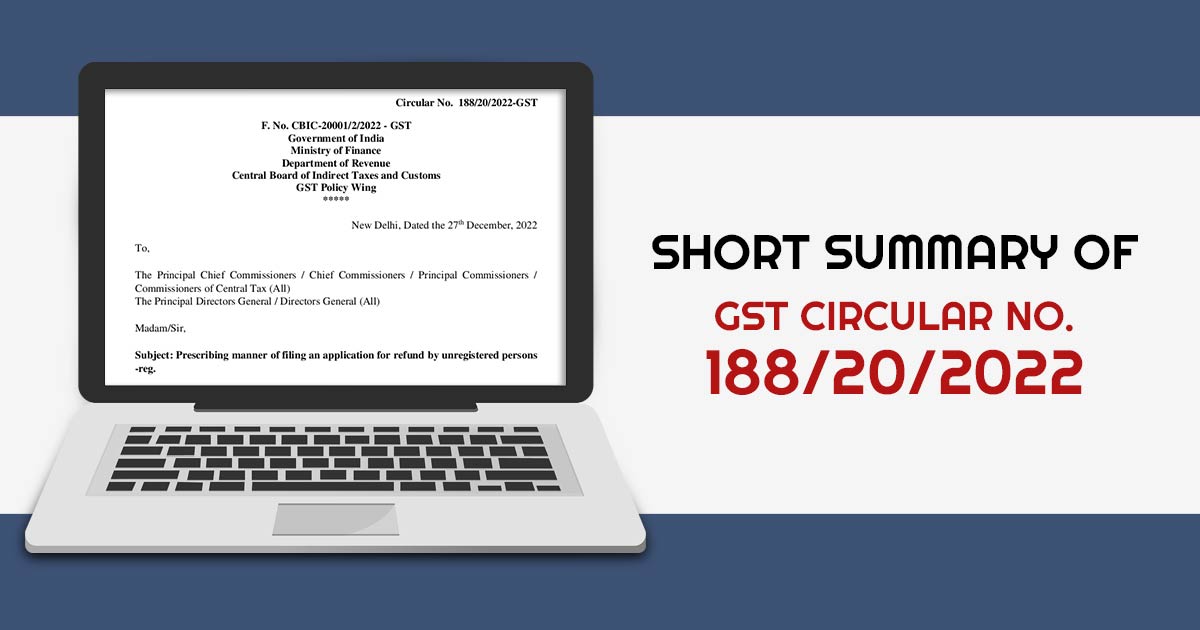
The method for submitting a request for a refund by an unregistered person under the GST system has been defined by the Central Board of Indirect Taxes and Customs (CBIC).
Considering the cases that have been brought to light, where unregistered purchasers, had a contract or arrangement with a builder for the provision of services for the construction of apartments, buildings, etc., and have made the whole or partial payment of the fee for the service, along with the appropriate tax, but later had to have the aforementioned contract or agreement terminated because the building activity was not completed on time or for any other reason. Many of these instances might have already passed by the time the Central Goods and Service Tax Act of 2017’s section 34’s deadline for the issuing of credit notes as a result of the service cancellation. After subtracting the amount of tax he has collected from the customer in these circumstances, the supplier may refund the money to the buyer.
In a circular issued on Tuesday, the CBIC stated that a “similar situation may arise in cases of long-term insurance policies where the premium for the entire period of the term of the policy is paid upfront along with applicable GST and the policy is subsequently required to be terminated prematurely due to some reasons. In some cases, the time period for issuing credit notes under the provisions of section 34 of the CGST Act may have already expired and therefore, the insurance companies may refund only the proportionate premium net off GST.”
According to the CBIC GST circular, the unregistered person must obtain a temporary registration on the common portal using his Permanent Account Number (PAN) in order to file an application for a refund under subsection (1) of section 54 of the CGST Act in situations where the contract or agreement for the supply of services for the construction of a flat or building has been cancelled or where a long-term insurance policy has been terminated.
The unregistered individual must choose the same state or UT where his or her supplier, in regard to whom an invoice refund is being requested, is registered while making this choice. Aadhaar authentication will be needed for the unregistered individual in accordance with the guidelines of rule 10B of the CGST Rules. Additionally, the unregistered individual would need to input the information for the bank account he plans to use to receive the return of the sum claimed. The applicant will give information on the bank account that is in his name and was opened using his PAN.
Beneath the class of the refund for the unregistered individual, the application for the refund will be furnished in Form GST RFD-01 on the common portal. The petitioner uploaded statement 8 (in pdf format) and all the requisite documents as per the provisions of sub-rule (2) of rule 89 of the CGST Rules. The claimed amount must not be more than the total tax amount of the tax shown on the invoices related to which the refund would get claimed. The petitioner uploads the certificate provided via the supplier for clause (kb) of sub-rule (2) of rule 89 of the CGST Rules including with the refund application. The application would indeed upload any additional documents for supporting the claim, furnished as per the tax incidence and the mentioned amount would be refundable to him.
When an agreement or contract for the supply of goods and services is cancelled or terminated and the time limit for the issuing of credit notes under section 34 of the CGST Act has not passed, the concerned suppliers may provide credit notes to the unregistered person. There would not be a requirement for the unregistered person to file a refund claim in these circumstances since the supplier would be in a position to additionally pay back the amount of tax that he had collected from the unregistered person. So, only in situations where the time limit for issuing a credit note under section 34 of the CGST Act has indeed passed at the time of cancellation/termination of the agreement/contract for the provision of services, may the unregistered person make a claim for a refund.
According to subsection (1) of section 54 of the CGST Act, applicants for refunds have two years from the relevant date to file their applications. The related data for the refund cases via the person excluding the supplier would be the receipt date of the goods or services or both via such person for the provisions of clause (g) in Explanation (2) under section 54 of the CGST Act.
However, if the contract is cancelled or terminated before completion of service for any reason, there may not be a date of receipt of service, to the extent that the supply has not been made or rendered, in cases where the supplier and the unregistered person (recipient) have entered into a long-term contract or agreement for the supply, with a provision for making payment in advance or in instalments, such as the construction of flats or long-term insurance policies. Hence for the case, for the purpose of finding out the related date for clause (g) of Explanation (2) under section 54 of the CGST Act, the date of issuance of the letter of cancellation of the contract/ agreement for supply via the supplier will be acknowledged as the date of receipt of the services by the applicant.